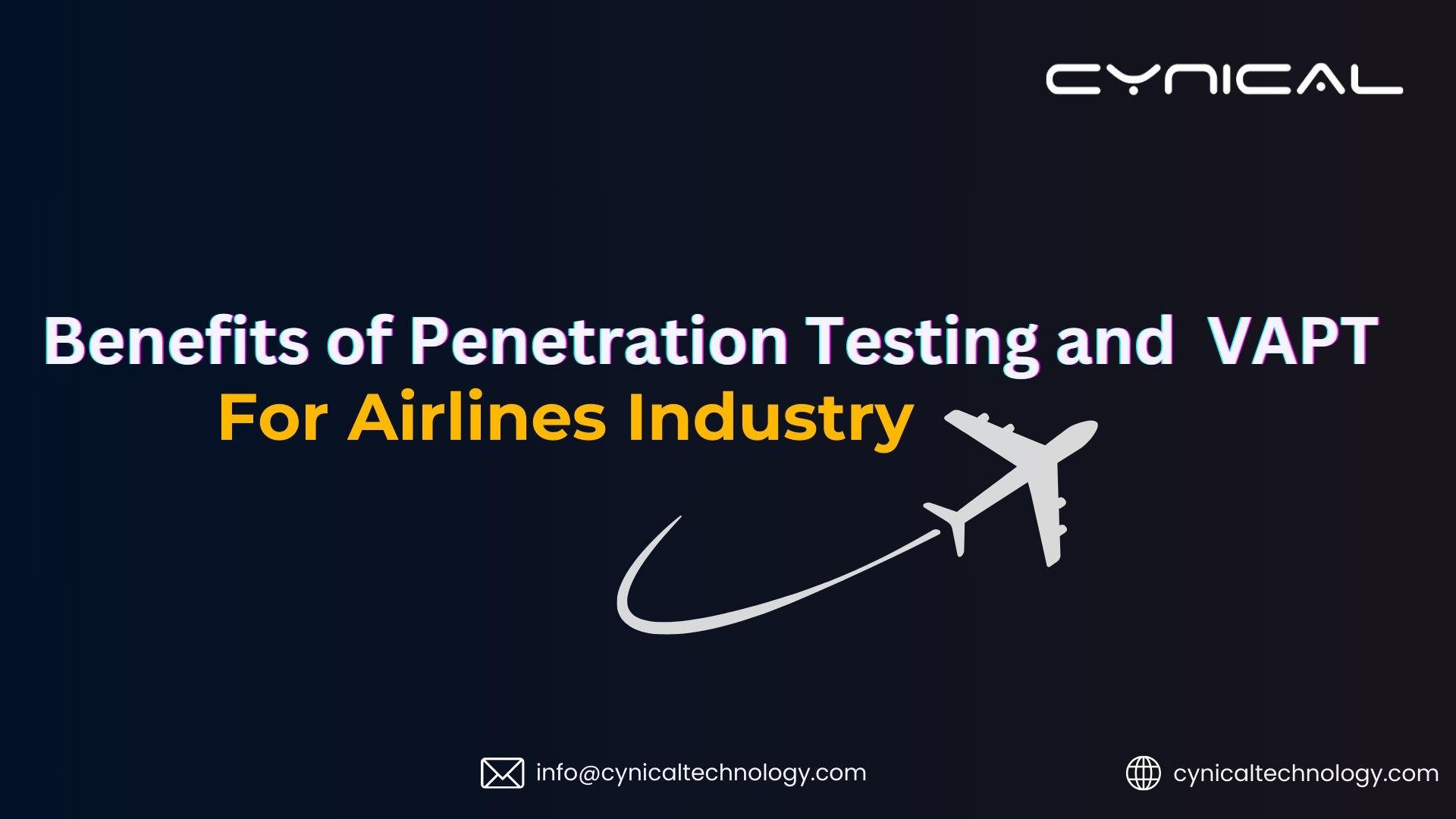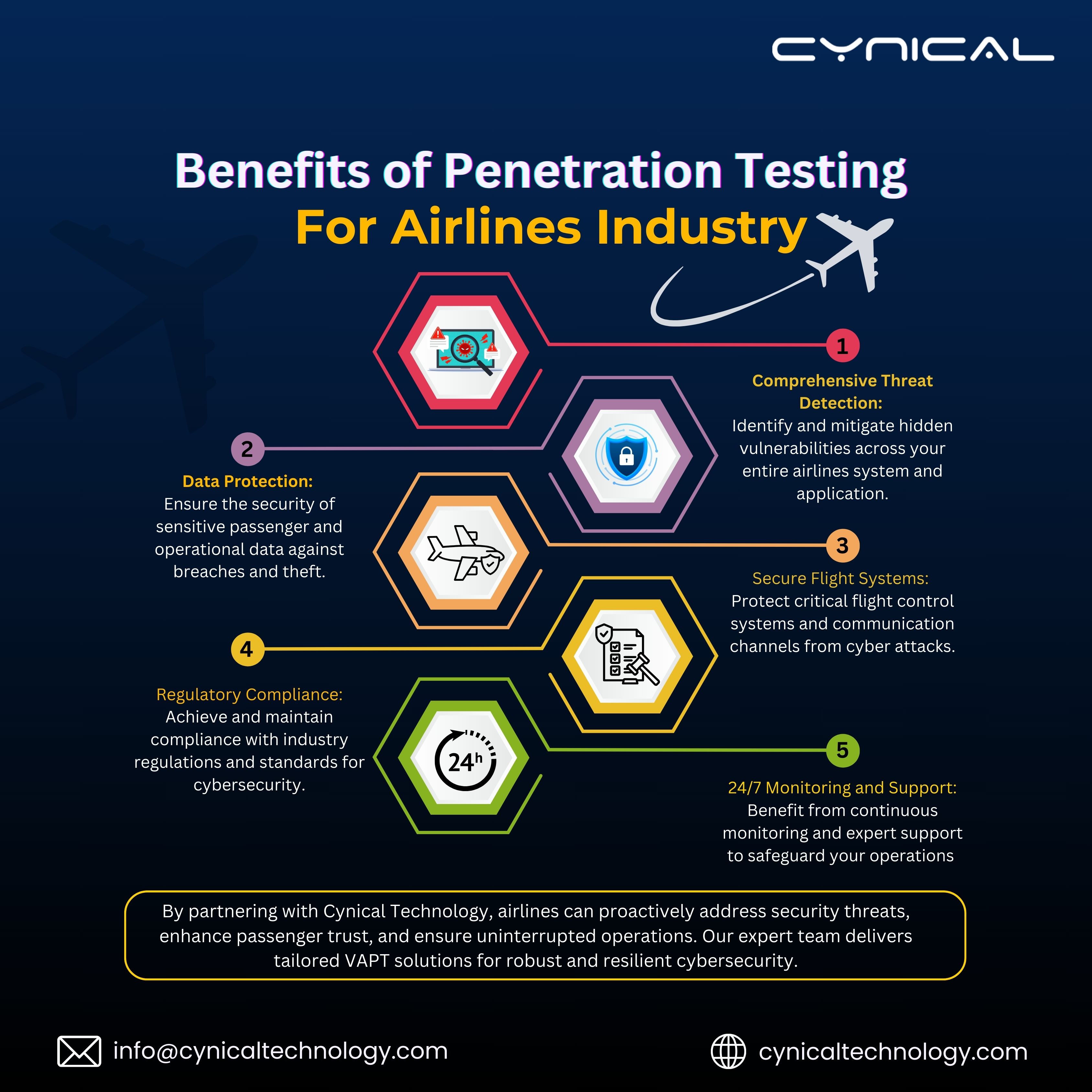- August 2, 2024
- Posted by: Bikash Sharma
- Category: Awareness

Securing the Skies: The Vital Role of Penetration Testing in the Aviation Industry
The airline industry stands as one of the most critical and complex sectors in the world. It facilitates global commerce, enables international travel, and supports the movement of goods and services. However, this complexity and scale also make it a prime target for cyber threats. With the increasing digitization of systems and services, aviation must prioritize cybersecurity measures to protect sensitive data and ensure the safety of operations. One of the most effective strategies in this regard is penetration testing. This blog delves into the intricacies of penetration testing, its necessity in the airline industry, real-world breaches, the benefits it offers, and how Cynical Technology can provide robust security solutions.
1. Understanding Penetration Testing

Fig: Visual representation of penetration test
Penetration testing, often referred to as pen testing, is a proactive approach to evaluating the security of a computer system, network, or web application. It involves simulating cyber attacks under controlled conditions to uncover vulnerabilities that could be exploited by malicious actors. The process typically includes several stages:
- Planning and Reconnaissance: This initial phase involves defining the scope and goals of the test, gathering intelligence on the target system, such as domain names and IP addresses, and identifying potential vulnerabilities.
- Scanning: In this stage, automated tools are used to understand how the target system responds to various intrusion attempts. This helps in identifying open ports, running services, and potential weak points.
- Gaining Access: Penetration testers attempt to exploit identified vulnerabilities to gain unauthorized access to the system. This stage often involves techniques like SQL injection, cross-site scripting (XSS), and phishing.
- Maintaining Access: Once inside, testers try to see how long they can maintain access without detection. This stage tests the system’s monitoring and response capabilities.
- Analysis and Reporting: The final stage involves documenting the findings, including the vulnerabilities found, the level of access gained, and recommendations for remediation.
Penetration testing is not a one-time event but should be part of a continuous security strategy, adapting to new threats and vulnerabilities as they emerge.
2. The Imperative of Penetration Testing in the Airline Industry
The airline industry faces unique cybersecurity challenges due to its reliance on interconnected systems and vast amounts of sensitive data. Here’s why penetration testing is essential:
- Protection of Sensitive Data: Airlines store a plethora of sensitive information, including passenger names, contact details, passport numbers, and payment information. A breach of this data can lead to identity theft, financial losses, and severe damage to an airline’s reputation.
- Operational Security: Critical systems such as flight control, communication channels, and reservation systems are integral to airline operations. A cyber attack targeting these systems could result in significant disruptions, financial loss, and even endanger passenger safety.
- Regulatory Compliance: The airline industry is subject to stringent regulatory requirements, including the General Data Protection Regulation (GDPR) in Europe and the Federal Aviation Administration (FAA) regulations in the United States. Regular penetration testing helps airlines meet these compliance standards, avoiding hefty fines and legal repercussions.
- Proactive Threat Management: The threat landscape is constantly evolving, with cybercriminals developing new tactics and techniques. Penetration testing allows airlines to stay ahead of these threats by identifying and mitigating vulnerabilities before they can be exploited.
3. Case Studies: Cyber Breaches in the Airline Industry
Several high-profile incidents highlight the vulnerability of the airline industry to cyber attacks:
- British Airways (2018): In one of the most significant data breaches in the airline industry, British Airways suffered a cyber attack that compromised the personal and financial information of approximately 380,000 customers. The attackers exploited a vulnerability in the airline’s website and mobile app, redirecting users to a fraudulent page that harvested their data. This breach resulted in a record fine under the GDPR.
- Cathay Pacific (2018): Cathay Pacific experienced a data breach that affected 9.4 million passengers. The compromised data included sensitive information such as names, nationalities, birthdates, and contact details. The breach went undetected for several months, highlighting the importance of continuous monitoring and testing.
- Delta Air Lines (2017): A third-party vendor’s system was compromised, leading to unauthorized access to Delta Air Lines’ customer payment information. This incident underscored the risks associated with third-party vendors and the need for comprehensive security measures across the supply chain.
These breaches demonstrate the potential consequences of inadequate cybersecurity measures and underscore the need for regular and thorough penetration testing.
4. Benefits of Penetration Testing for the Airline Industry
Implementing penetration testing offers a multitude of benefits for airlines, enhancing both security and operational resilience:
- Comprehensive Threat Detection: Penetration testing provides a detailed understanding of vulnerabilities across systems, applications, and networks. This allows airlines to address weaknesses before they can be exploited by attackers.
- Data Security: Protecting sensitive passenger and operational data is crucial. Penetration testing helps identify potential security gaps in data handling processes, ensuring robust data protection measures are in place.
- Operational Integrity: By testing the security of critical systems like flight control and communication networks, airlines can prevent disruptions that could arise from cyber attacks. This is vital for maintaining safety and trust.
- Regulatory Compliance: Regular penetration testing helps airlines comply with industry regulations and standards, such as GDPR, PCI DSS, and the FAA’s cybersecurity guidelines. This not only avoids legal penalties but also enhances customer confidence.
- 24/7 Monitoring and Support: Partnering with a cybersecurity firm for penetration testing often includes continuous monitoring services. This ensures real-time detection and response to potential threats, minimizing the risk of successful attacks.
5. Conducting Penetration Testing with Cynical Technology
Cynical Technology offers specialized Vulnerability Assessment and Penetration Testing (VAPT) services tailored to the airline industry’s unique needs. Our approach is comprehensive, covering all aspects of security testing:
- Customized Testing Plans: We understand that each airline has unique security requirements. Our experts work closely with your team to develop a testing plan that addresses specific vulnerabilities, taking into account your existing infrastructure and threat landscape.
- Advanced Tools and Techniques: Using the latest tools and methodologies, our penetration testers simulate realistic attack scenarios. This includes testing for vulnerabilities such as SQL injection, cross-site scripting, and malware infections.
- Detailed Reporting and Actionable Insights: Post-testing, we provide a detailed report highlighting all discovered vulnerabilities, their potential impact, and practical recommendations for remediation. Our reports are designed to be understandable and actionable, helping your team implement the necessary fixes effectively.
- Continuous Support and Training: Beyond testing, Cynical Technology offers ongoing support and training to help your organization maintain a robust security posture. This includes regular updates, threat intelligence, and assistance with implementing security best practices.
In the face of evolving cyber threats, protecting your airline’s data and systems is not just a regulatory obligation; it’s a critical aspect of your business’s integrity and reputation. Partner with Cynical Technology to fortify your cybersecurity defenses through comprehensive penetration testing. Ensure the safety of your passengers, secure your operations, and maintain compliance with industry regulations.
Get started today by contacting us:
- Email: info@cynicaltechnology.com
- Website: cynicaltechnology.com
Secure your skies. Protect your passengers. Partner with Cynical Technology for unparalleled cybersecurity solutions.
Investing in penetration testing is a proactive measure that can save airlines from the devastating consequences of a cyber attack. By regularly testing and improving security measures, airlines can not only protect their operations and passengers but also build a reputation as a trusted and secure service provider in a highly competitive industry.


